
[ad_1]
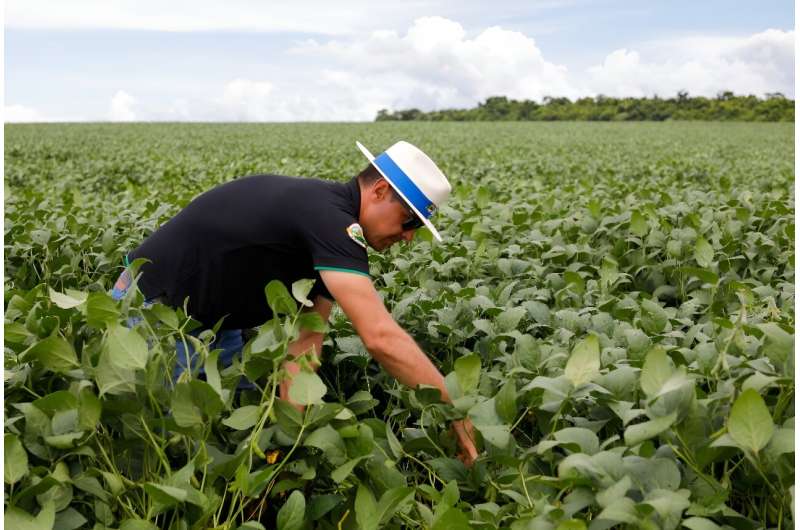
Agricultural engineer Adriano Crunell checks his soybean plants in Montevideo, Brazil.
Inspecting a flourishing green field, Brazilian farmer Adriano Cruenal beams: Using a fraction of the chemical products he used to use, he grows more soybeans thanks to natural pesticides.
Agricultural powerhouse Brazil could be a world leader in chemicals. Pesticide useBut Coronaville is part of a growing trend among farmers. Natural products Known as “biopesticides”.
“Our soybeans are doing very well,” says the 36-year-old agricultural engineer, visiting his 1,400-hectare (about 3,500-acre) farm in the central-western county of Montevideo, as combine harvesters work their way through. Playground
“Thanks to the microorganisms we plant on the crop, it is much more resistant to pests and diseases.”
Brazil, the world’s largest exporter of soy, corn and cotton, is also the largest consumer of chemical pesticides: about 720,000 metric tons in 2021, or a fifth of global sales, according to the Food and Agriculture Organization of the United Nations. Share.
In an effort to improve its profitability, in 2016 Krunel began a transition to so-called “renewable” agriculture.
This technique seeks to restore soil biodiversity, replacing chemical fertilizers and pesticides with natural alternatives.
He still uses genetically modified soy, which is widespread in Brazil. But near these fields he built a very modern laboratory and factory.
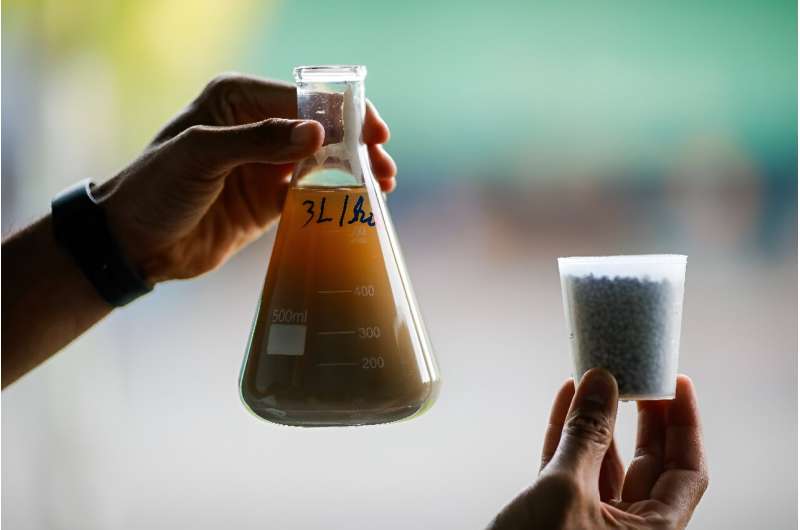
Organic products, including fungi and bacteria, are used as natural pesticides by grower Adriano Cronell.
Inside, refrigerators store fungi and bacteria, some of which are harvested from forest land on his farm.
He grows them on a large scale in vats, then uses them to treat his fields.
“Here, we largely mimic nature,” says Cronell, who has replaced 76 percent of the chemical pesticides he previously used with natural products.
This approach is good for health and the environment, but also for business: theirs Production costs He says there has been a 61 percent drop, while his soy production has increased by 13 percent.
‘Long Way to Go’
Natural pesticides “could revolutionize Brazilian and global agriculture,” says Marcos Rodríguez de Faria, a researcher at Embrapa, Brazil’s public agricultural research agency.
But “there’s still a long way to go,” he adds.
Brazil still relies heavily on chemical pesticides, known here as “agrotoxicos” or “agrotoxic” products.
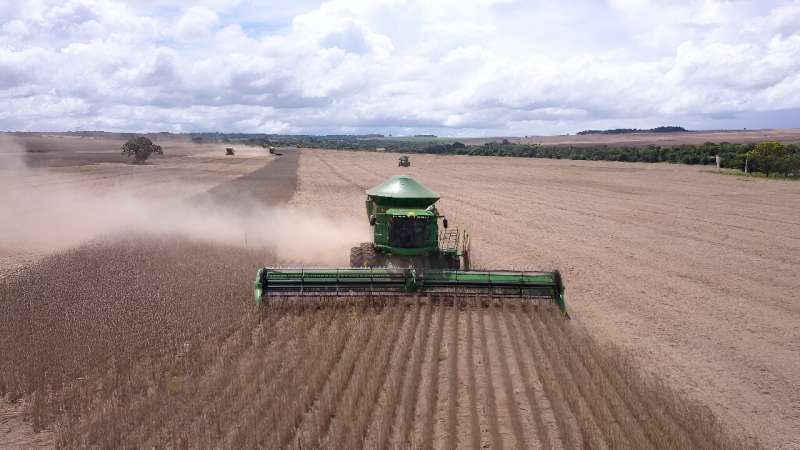
Workers harvest soybeans in Montevideo, Brazil.
Natural products will increase from four percent of total pesticide sales in Brazil in 2020 to nine percent in 2022.
Amalia Borsari of CropLife Brazil, an organization representing the agrochemicals industry, says their use in Brazil has quadrupled internationally.
“There’s been an exponential growth,” she says.
Larissa Bombardi, a geographer of pesticide use in Brazil, calls the trend “interesting.”
But she says this is not yet changing Brazil’s dominant model of large-scale, land-intensive monocrop agriculture, which leaves little room for small-scale producers or more environmentally friendly practices. .
“The area of cultivated land in Brazil increased by 29 percent from 2010 to 2019, while pesticide use increased by 78 percent,” she says.
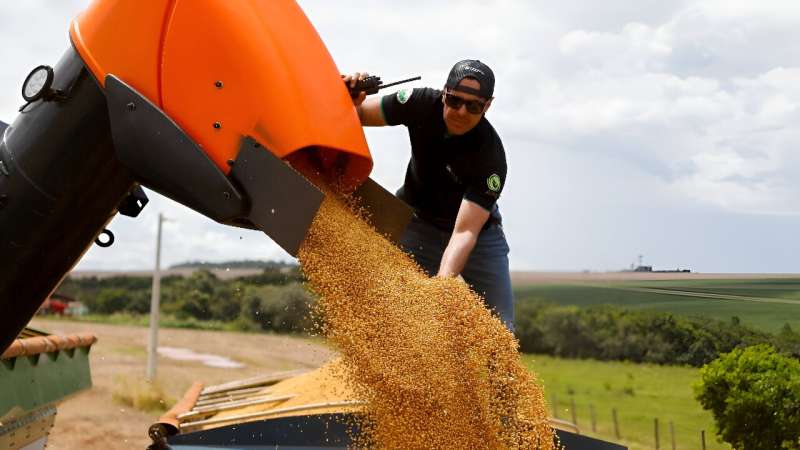
The agribusiness sector — including soybeans, seen here — makes up about a quarter of Brazil’s economy.
‘Gift for Agribusiness’
The agribusiness sector makes up about a quarter of Latin America’s largest economy, making the pesticide debate politically charged.
After a long standoff with Congress, where agribusiness interests are a powerful force, President Luiz Inacio Lula da Silva signed a bill into law in December easing regulations on agricultural chemicals.
Veteran leftists used their line-item vetoes to block some controversial aspects of the bill. But the final text significantly lowered the bar for regulatory approval of new pesticides, drawing sharp criticism from environmentalists.
Chemicals that can cause cancer and mutations or harm the environment are no longer automatically banned – only those that represent an “unacceptable risk”.
Bombardi called the law a “tragedy” and “a gift to agribusiness and the agrochemical industries.”
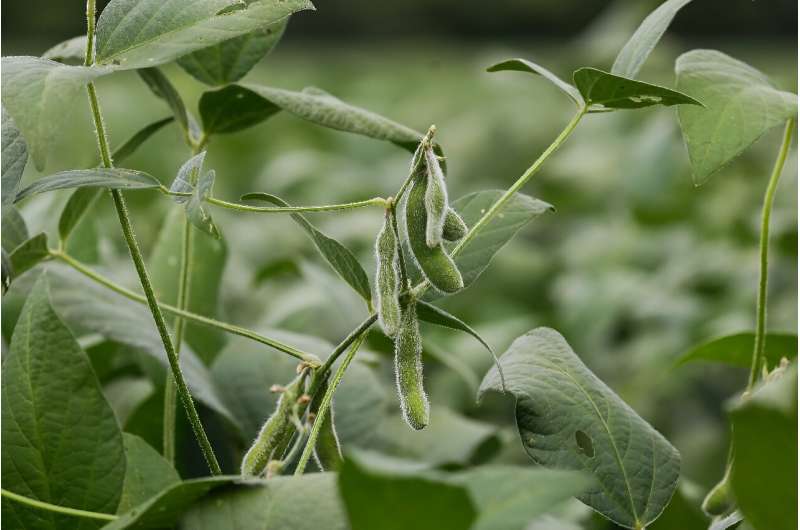
Brazil, the world’s largest exporter of corn, cotton and soy (seen here), is also a top consumer of chemical pesticides.
The stakes are ahead of Brazil.
The country’s widespread use of pesticides is one of the main objections raised by opponents of the landmark trade deal between the European Union and South American bloc Mercosur, in which Brazil is a major player.
© 2024 AFP
Reference: Natural pesticides gain ground in ‘agricultural poison’ capital Brazil (2024, February 19) Accessed 19 February 2024 at https://phys.org/news/2024-02-natural-pesticides-gain-ground-agri Retrieved from .html
This document is subject to copyright. No part may be reproduced without written permission, except for any fair dealing for the purpose of private study or research. The content is provided for informational purposes only.
[ad_2]


